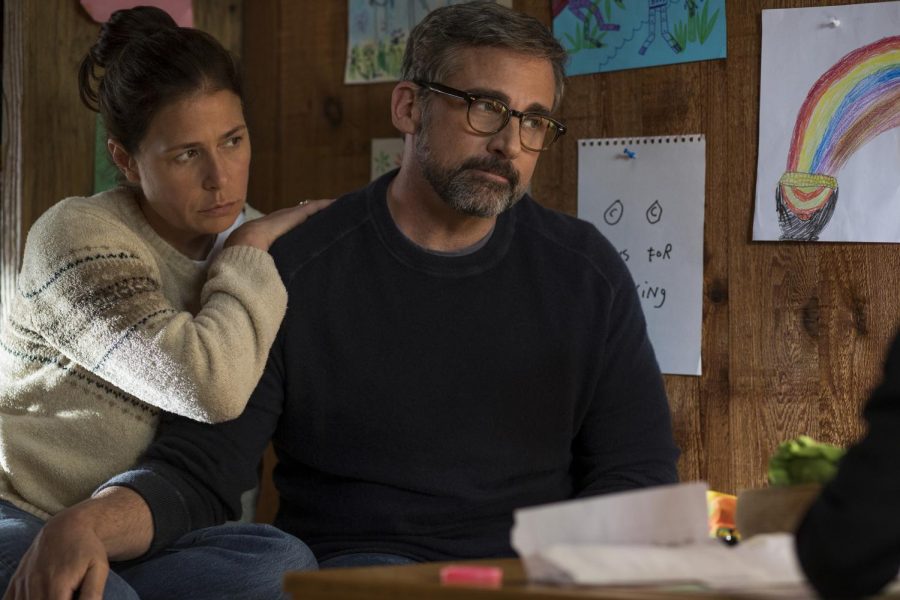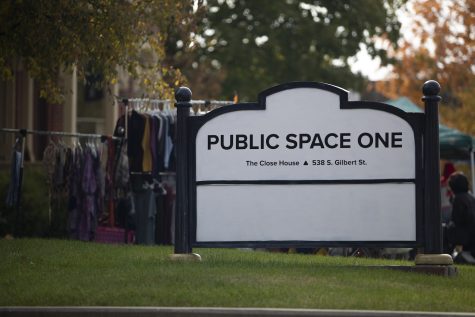Review: Beautiful Boy falls short in exploring the depths of addiction
The new blockbuster featuring Steve Carell and Timothée Chalamet lacks the family chemistry to explore addiction and its impacts fully.
Maura Tierney as Karen Barbour and Steve Carell as David Scheff in the film “Beautiful Boy.” (Francois Duhamel)
November 14, 2018
With “Beautiful Boy”, Felix van Groeningen stumbles through his English-language début. The Belgian filmmaker, active since the early 2000s and acclaimed for films such as 2012’s “The Broken Circle Breakdown” and 2016’s “Belgica”, attempts to tackle the complex subject of addiction with too much melodrama and without the nuance that such a matter requires.
“Beautiful Boy” stars veteran actor Steve Carell and recent indie-heartthrob Timothée Chalamet as David and Nic Sheff, respectively, whose memoirs “Beautiful Boy” and “Tweak” provided the basis for the film.
The story follows David, Nic, and their close father-son relationship, which begins to strain and deteriorate as Nic delves into heavy drug use and ultimately, severe addiction. The film chronicles the highs and lows, but not so much the in-betweens, of their relationship, mainly alternating between the idyllic past of Nic’s upbringing as seen by David and the unfortunate reality of the present witnessed by both.
Throughout the excess of exposition in first half of “Beautiful Boy”, the issues of the film are gradually introduced. Carell is poorly cast in the role of David; his expressiveness, which more-or-less amounts to increasing and decreasing the volume of his voice, comes off as unconvincing and incapable of translating the emotional taxation of a father dealing with his combative and wayward son. Carell can be helpless when the film requires it, but he falters when the film demands a wider scope of emotion from its cast. Chalamet outacts him on all fronts, on the other hand; the dynamic displays of pain and pleasure from his drug use can be visceral and poignant, yet contrary to his counterpart, he has a tendency to overact in the film’s more trivial scenes, and his character further suffers from a lackluster script.
Unsurprisingly, Nic has lived a cliché adolescence for a future addict, surrounding himself in the art of Bukowski, Cobain, and Bowie. His arguments with David during his increasing drug use are similarly unsophisticated, amounting to little more than “f**k you, dad” or “give me money,” followed by running away from it all, leaving his father alone in defeated silence. Whenever Nic shoots up heroin or indulges in crystal meth, an exaggerated display of bliss appears on screen, and when he suffers from overdoses and hospitalizations, we see more of a martyr than an addict lying on the ground. The relapses and indulgences of Nic’s addiction are glorified more than his own recovery, and we only see glimpses of the complexities that lie between the extremes of addiction — the expert opinions here and there, the sponsor who helps keeps Nic clean, and his times in rehab are in the periphery of the film, and even more in the periphery are his mother figures.
Given the limited perspective of a memoir form, a cinematic adaptation has potential to elaborate on its story with additional facets and points of view that may be lacking from its source material. However, “Beautiful Boy” loses this potential by focusing almost exclusively on Nic’s and David’s relationship. Nic’s mother (Amy Ryan) and stepmother (Maura Tierney) make insubstantial appearances in the film more as alternatives to David’s parenting or last-ditch efforts to keep Nic from running away or relapsing again. A crucial family dynamic eludes the film as van Groeningen keeps the spotlight away from Nic’s mother figures and relatives, who certainly feel the effects of his pain and deterioration to a similar degree that David does.
“Beautiful Boy” is a film fixated on extremes; the extremes of relationships and the extremes of addiction are at the forefront, while the slivers of sentiment and mediation are put on the back burner. Moments in which the complexities surrounding addiction and treatment are actually addressed in the movie are artlessly inserted throughout the plot, and, quite literally, tacked on at the end. By devoting so much attention to the highs and lows rather than the intricacies that lie between, “Beautiful Boy” seems more like a star-studded, big-budget anti-drug public-service announcement than a portrait of a distressed family tackling addiction.














